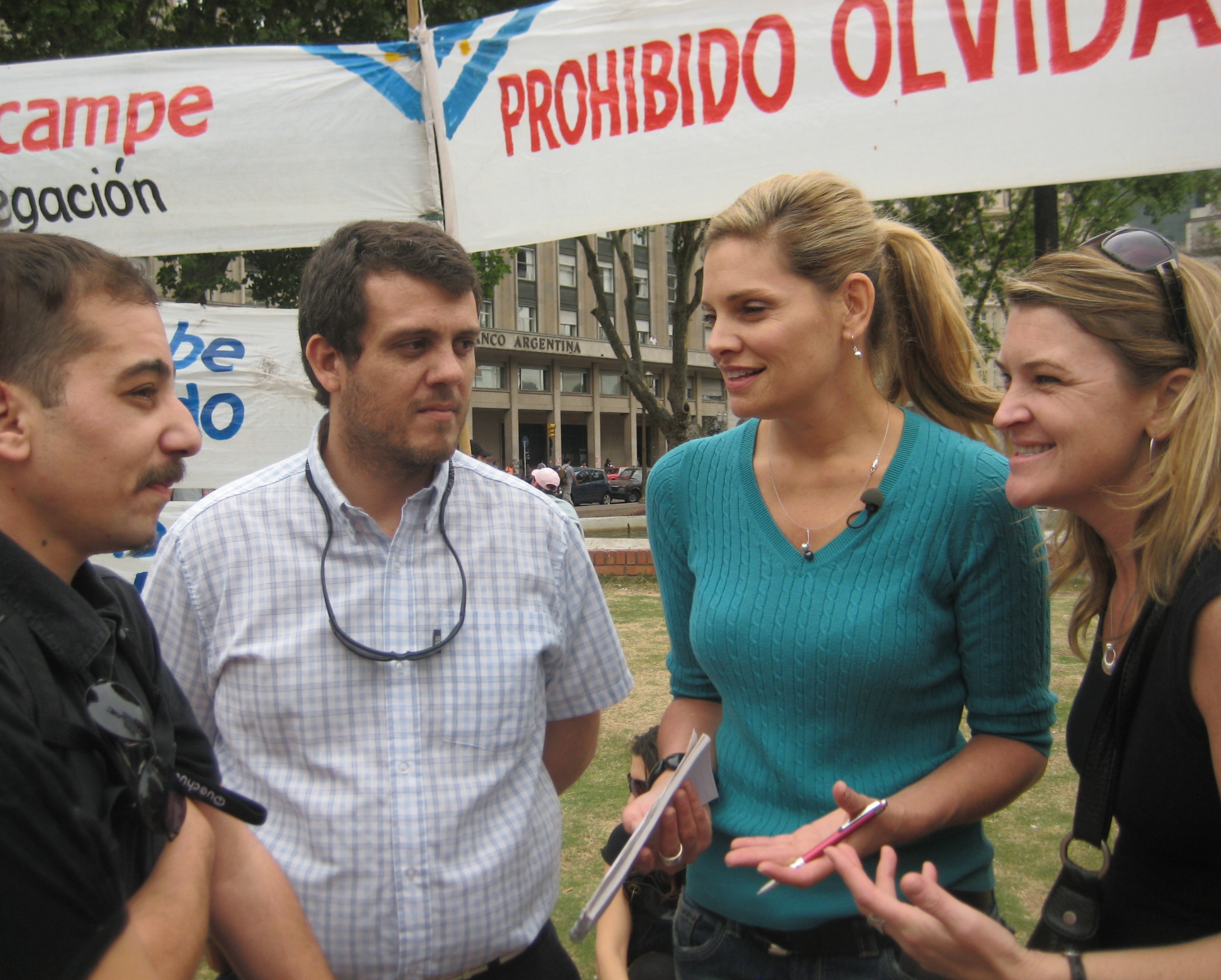You are here: Home > Caught in Translation (Field Notes from Argentina) by Julienne Gage

Caught in Translation, Buenos Aires, 2010
Producer Field Notes from the HDNet World Report Documentary
This is a blog I wrote from Buenos Aires in December 2010 while producing a documentary about the search for adult children of people who disappeared during Argentina’s Dirty War for HDNet World Report. I learned that serving as interpreter is not an impersonal role.
by Julienne Gage
Alejandro Sandoval Fontana, the son of parents who disappeared during Argentina’s 1976-1983 military dictatorship, detailed his life story to HDNet Correspondent Jennifer London in Buenos Aires, with me as his English-language mouthpiece this week. The process was simple enough. Jennifer would ask a question and I would interpret. I would then let Alejandro finish his entire response and summarize it for Jennifer with the intention of conducting a literal translation during the tape logging.
About six years ago, Alejandro learned that the military family who raised him as their own had actually stolen him from his mother, an 18-year-old woman named Liliana Clelia Fotana Deharve, who was held in a clandestine prison in Buenos Aires along with her husband Pedro Fabian Sandoval. Toward the end of the interview, Jennifer asked what Alejandro had been able to learn of his biological parents. He smiled, noted that friends and family said they had married for love in a tumultuous time, and then offered an example of how that love manifested itself.
I began my summary, detailing how the couple worked side by side in forced labor at the detention center. Each had a song for the other, and they would sing them like a call and response. When I went to explain the rest of the anecdote, my body rebelled. My throat swelled, I gasped for breath, and I feared that if I spoke, wailing would replace words. I took a pause, but it was too late, tears began to pour down my face.
Our crew was caught off guard, for of all the atrocities relayed to us in recent days, it appeared that the love story was what made me cry. That certainly helped, but it was what I hadn’t yet interpreted that did me in…
There came a night when the guards led Alejandro’s father out alone, and as he left, he sang to his wife for the last time. He was then drugged, loaded onto an airplane bound for the Atlantic Ocean, and dumped in the sea.
Certainly there have been other times in my journalism career that I struggled to control my emotions while encouraging sources to express theirs freely. And of course, anyone who speaks more than one language also understands the joys and trials of capturing the nuances of each. But generally speaking, I suppose I thought of interpreting as an impersonal act, just an information-gathering task within my larger role as producer.
Shortly after I gained my composure and finished the story, I felt embarrassed. How could I lose my concentration when a reporter needed the facts so that she could get the emotion straight from the source’s mouth?
Hearing Alejandro’s anecdote was awkward enough. But subconsciously, my body recognized that my job wasn’t to pause and come up with a new question; it was to briskly repeat the terrible news, almost as if it were my own.
Between the change in climate, the long work hours, the constant interpreting, and, of course, the physical toll of battling tears, that night I developed laryngitis and had to find a bistro to make me a hot lemon infusion. It soothed me, as did the kindness of the waiter who called me mi amor every time he peered into my troubled face. Perhaps he too imagined I was a hopeless romantic confronting some sappy romance-gone-sour.
As I walked back to my hotel in the dark summer night, the tears welled up again. I grieved the loss of all those people whose family members disappeared, thanks to the barbarity of their fellow human beings. But then I smiled at the thought of people like Alejandro reminding me that this three-decade story is far from outdated, and while we must rehash the ugliness, so too must we search for those glimmers of hope.
I was so shaken during the interview that I forgot to summarize the moral Alejandro gave to his painful anecdote, but our cameras captured it all.
Alejandro explained that he finds solace in knowing his parents’ sweet gestures brightened their darkest hours, and inspired other prisoners. Just knowing that helps guide him through this long, strange tunnel of self-recovery and discovery that he will surely be traveling for years to come.
See the trailer to the HDNet World Report Documentary:
Posted on November 27, 2011
by Gage
in Field Production Notes, Uncategorized
Tags: argentina buenos aires children of the disappeared grandmothers of the disappeared
Subscribe
Subscribe to our e-mail newsletter to receive updates.
 Julienne Gage
Julienne Gage is a multimedia journalist and cultural anthropologist based in Miami, FL.
Julienne Gage
Julienne Gage is a multimedia journalist and cultural anthropologist based in Miami, FL.
